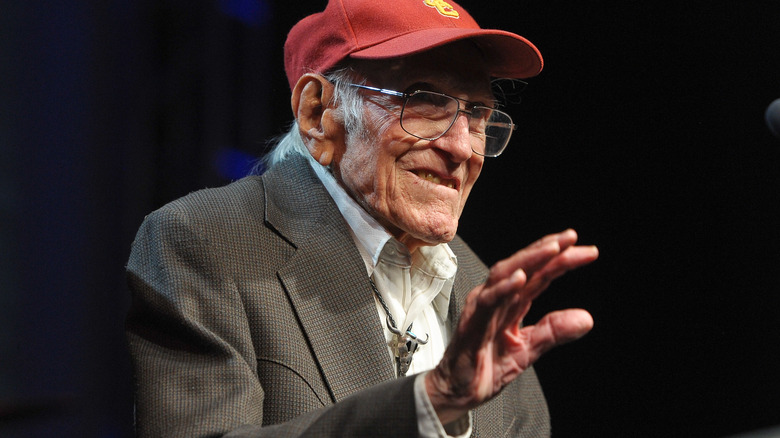How Historically Accurate Is The Movie Unbroken?
In 2014, Angelina Jolie's "Unbroken" premiered on Christmas in the United States. Written by the Coen brothers of "Fargo" and "No Country for Old Men" fame, the film (and the book it was based on) covers the extreme hardship faced by 1936 Olympian Louis Zamperini during World War II. Part of a bomber crew in the Pacific theater in 1943, his aircraft was shot down and forced to ditch over the open water, per Biography. Russell Phillips, Francis McNamara, and Zamperini were the only survivors.
For 33 days, they faced dehydration, starvation, shark attacks, and hostile Japanese aircraft. McNamara eventually died, while Zamperini and Phillips were captured by a passing Japanese ship, beginning their long journey as POWs. Many critics were not impressed with how the film omitted details and dragged others out (per The Mercury News). While there is truth to this, Jolie nevertheless took great care in ensuring the authenticity of what was included, even consulting with Zamperini himself on details that needed ironing out (via Vanity Fair).
Faithful to Zamperini's wartime experience
According to Slate, Louis Zamperini and Russell Philips were given decent treatment aboard the vessel, which was not featured in "Unbroken." It brought them to the Japanese-occupied Marshall Islands, where they were starved and interrogated before being sent to different POW camps. From here the film correctly, albeit extremely reservedly, depicts Corporal Mutsuhiro Watanabe as a ruthlessly cruel camp director who singles out and cruelly tortures Zamperini for his Olympic past (via Daily Mail).
During this time Zamperini was sent to Radio Tokyo, where he was able to broadcast a message that he was alive, but refused to read propaganda messages in exchange for preferable treatment. He remains in the camp until the end of the war, after which he is freed and Watanabe successfully escapes war-crimes charges (via History vs Hollywood). The span of time that Jolie covered is exceptionally faithful to the accounts of Zamperini and his fellow POWs. What some critics have pointed out, however, is that his life after the war was reportedly plagued by PTSD and alcoholism, which was why Zamperini's later commitment to his faith was such a turning point in his life (via NPR).

